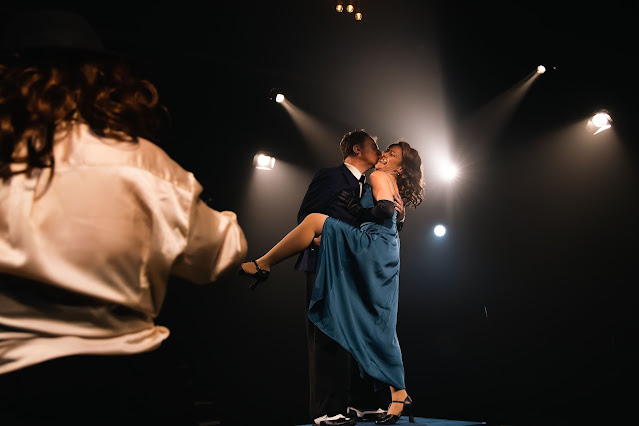Let's catch up.
On Monday I joined friends to catch The Wind in the Willows Wiltons at Wilton's Music Hall, chiefly to see Darrell Brockis as Toad; it's amazing what a really high-waisted pair of trousers can do to a man's shape. The weasels were sort of bankers now, as was the book's original author
Kenneth Grahame, who resigned as Secretary of the Bank of England in
1908 after either being nearly shot in the face during an anarchist
raid, or – depending on which motive you ascribe to the enforced retirement – accusing the Bank's future Governor of being "no gentleman", so I've no idea whose side he'd be on here.
(I have only my parents word for it that, many Christmases
ago, "Toad of Toad Hall" was the first show they ever took me to. It was the biggest room I'd ever been in. They tell me the sheer scale of the room made me whimper, then the lights lowered, and I didn't like that at all, and then old
man dressed as a mole stuck his head out of a trap door and shouted
"Hang white-washing!" and I howled and we left and that was it.)
Pleasingly concurrent with the fortunes of Toad Hall in this production were that of the baby otter puppet, Portly: It's always nice to see the inclusion of Pan, and "Piper at the Gates of Dawn" made a lot more sense as subplot here rather than just interlude. A lovely, lively, warm evening, and Wilton's Music Hall is an exciting space to explore during an interval. Do these photographs convey that?
I don't know. Badphone finally expired on Sunday, alas, but I appear to have found a
replacement with just as MySpace-era a camera, which was not my intention. I'll have to start hanging around more light.
On Tuesday I caught up for drinks with an old friend who told me that she can get married in Saint Paul's Cathedral, a thrilling possible future theatre project. I also found the following extraordinary performace on youtube while searching for video essays on "Brimstone and Treacle". I'd never made the connection before between Dennis Potter's fable of Satanic Home Invasion, and Mary Poppins (OR HAD I?)
I just wanted to write a good part for Olivia Colman.
And the TKA Smith Family Conservatory of the Art's family production of Poppins sheds little light on the banned seventies teleplay. But it does throw up a blisteringly confident turn from an uncredited singer in a role I don't remember as a rival nanny with a bun of grey hair fastened inexplicably to the top of her head, which the Conservatory has liked so much they've posted twice. In case you didn't manage to catch a Christmas show yourself this year I share both versions here, not for comparison, but to be played simultaneously to see if the resulting reason-shredding resonances open a portal to anywhere.
On Wednesday evening we performed the ante-penultimate Love Goddess at the Cockpit Theatre. The weather was milder now. The snow had gone. I didn't walk home directly. Badphone's replacement took what it could.
On Thursday, well, I wrote last Sunday's post, but I also learnt that that ante-penultimate show had actually been our penultimate as one of the cast had fallen ill, although testing negative for Covid. We'd planned our cast drinks for that evening however as some people had to rush off on Friday, including myself, who would have to be up early to catch a flight from Gatwick on a day of border control and train strikes. Our producer Laura had booked a table at a pub called the Pereseverance, and I hadn't left the flat all day.
As with the long walk home on Wednesday I found a refreshing solitude in that place. The barman gave me a Guiness in a weird glass, free nuts and sample of an unnamed Christmas cocktail he'd worked on. A lot was ending. Enjoying the uniterrupted ambience, it occured to me I could just try and go straight
to Gatwick after the final show though and not worry about sleeping Friday night.
I woke at midday, feeling finally Christmassy. The last night went ahead and everything felt new, which may not be unusual for a last night. As I said from the start, everyone's lovely, and while I may not have tried so much towards the end not to be too weird, it's only because that's what happens when you get to know people.
Then that stops, and there's no getting used to it. The show's over. Almog's on another continent now, and I took the Thameslink to Gatwick however many hours ago it was and found a nice, small copy of "Pinocchio" at the airport bookshop. Its tone is very Vic and Bob. In fact Bob Mortimer would make a brilliant Pinocchio. I woke on the plane surprised to see the land up at the top.
Mum met me at Montpellier just as I received the message that the cast member had now tested positive for covid after all, but that was okay because Susy's tested positive for Covid too. We made it down. That's the main thing. Dad showed us "Creature Comforts" in the cinema (because it's important to be reminded just how perfect Aardman can be...)
Tom put on the "Bottom" Christmas special. I'm about to put the presents out. I was meant to be cacting up on sleep but appear to haev written this instead. I hope you get everything you want this Christmas, ole unatendees.
Here, one more time, is Orson Welles.
Big ball to stick your head in by Arthur Handy.

.jpg)
















































